For the fourth time, the European Economic Conference (EEC) took place on June 3rd and 4th, 2025 in Berlin. The conference was initiated in 2022 by the Frankfurter Allgemeine Zeitung (F.A.Z.), the European School of Management and Technology (ESMT), and United Europe. This year, over 300 decision-makers from business and politics had registered to participate – the EEC is growing and increasingly becoming an important meeting point for those who want to shape Europe’s political and economic future. Around 40 speakers and thought leaders discussed in 15 speeches and panel discussions how the economic location Europe can grow safely and sustainably, and how initiatives can enhance competitiveness and innovation.
After the welcome speeches by Gerald Braunberger (Publisher of Frankfurter Allgemeine Zeitung) and Jörg Rocholl (President of ESMT), who openend with Günther H. Oettinger (President of United Europe, e.V.) the two-day conference, business leaders and politicians discussed current European topics. Among the speakers were Karan Bhatia, Global Head of Government Affairs & Public Policy, Google, Andrea Casaluci, CEO, Pirelli, Dr Markus Krebber, CEO, RWE AG, Prof Reinhold R. Geilsdörfer, Managing Director, Dieter Schwarz Foundation gGmbH, Marzena Czarnecka, Minister of Industry, Republic of Poland, Jens Spahn, Leader of the CDU/CSU Parliamentary Group, and Andreas Mundt, President, Federal Cartel Office. Two representatives from United Europe’s corporate members were also present: Hugh Elliott, Executive Chairman, Iberdrola Energía Internacional, and Dr. Laura Hirvi, Public Policy Manager DACH, Meta.
You can view the full recap of the EEC on the EEC website here.
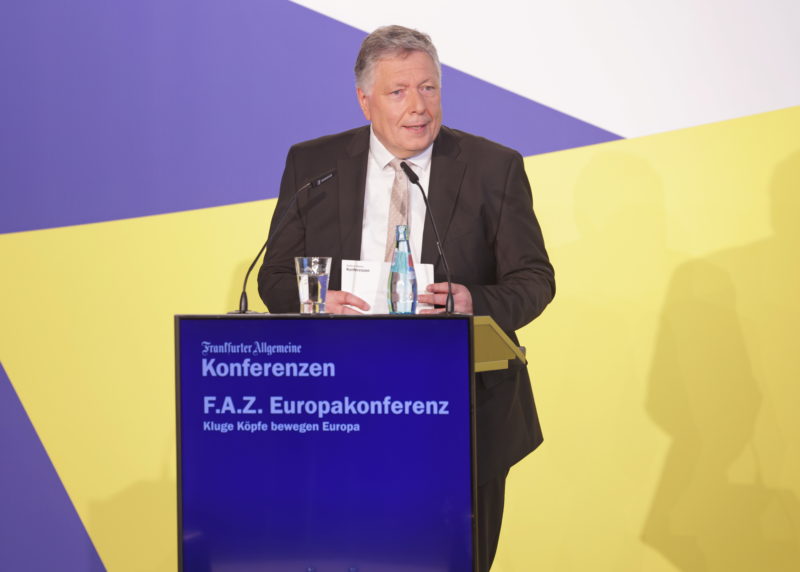
Europe is an economic giant, a political dwarf, and a military worm,
as Belgian Prime Minister Marc Eyskens stated back in 1991. Gerald Braunberger, publisher of the Frankfurter Allgemeine Zeitung (FAZ), referenced this assessment in his opening speech. He warned: Europe is not only at risk of falling behind the USA economically, but it is particularly lacking a comprehensive Grand Strategy that defines and aligns economic, political, and military goals. The European Union’s deficits compared to the United States are glaring – both in terms of per capita income and economic performance. However, the gap also shows on another, highly modern front: space. Of approximately 10,000 operational satellites worldwide, around 7,600 belong to Starlink, Elon Musk’s satellite network. The company has already received approval for an additional 20,000 satellites. In contrast, the European Space Agency is struggling with its Iris 2 project, which aims to launch just 300 satellites into orbit – a symbolic number compared to the ambitions of other global players.
Europe is thus facing a profound transformation – and it is a difficult one. Braunberger sums it up: “If we are honest, we only change under pressure. The election results of recent years should have already generated enough pressure. But today we are additionally under the pressure of three elderly men who are not based in Europe: Donald Trump, Vladimir Putin, and Xi Jinping. Whether it will be enough for the state to simply spend money without providing strategic answers remains questionable.”
One of the founding fathers of the EU and European visionary Jean Monnet once predicted that Europe would shape itself in times of crisis, and the sum of the solutions would define the Europe of the future. A very accurate observation – yet quick responses to unforeseen crises often remain mere improvisation. And improvisation is the opposite of strategy.
What Europe now needs is an open, public dialogue about strategic issues – a call directed equally at politics, the media, and civil society.
Gerald Braunberger, Editor of Frankfurter Allgemeine Zeitung
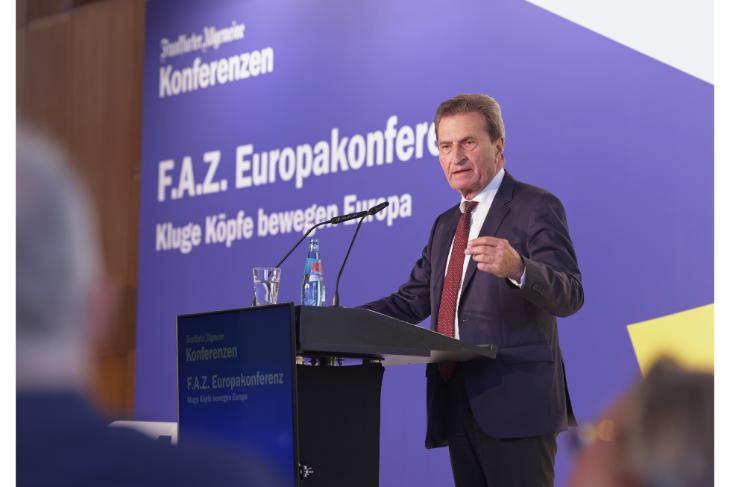
The Opportunities Trump offers to Europeans
were discussed by Günther H. Oettinger (President of United Europe e.V.) in his opening speech, among other topics. Between an irrational, dominant president in Washington D.C. and a rational, super-dominant dictator in Beijing, Europe now has the chance to regain trust. Trump is losing trust – and will not get it back. His trade war, his economic war, and the daily changing tariffs are unsettling investors, frightening market participants, and harming the U.S. more than any other region in the world. The embrace and simultaneous blackmail by China is also troubling many in the Arab world, Africa, and other regions. Now could be Europe’s time: as a safe haven for capital, investments, and as a reliable partner in international law – if the right conditions are created, we are able to act, and we make use of our leeway to address the big issues.
Mercosur? Even in Berlin, the trade agreement is viewed critically, and it is rejected in France, Austria, and Poland. Is an agreement possible without Europe patronizing or dominating Latin America? If not, we are missing a great opportunity. Other trade agreements – with the Emirates, India, Australia – are possible. Doors will open if they are defined based on clear legal frameworks. Trade must become a priority for the European Union now.
Warning of the “Liz-Truss-Effect”
I believe what happened with Liz Truss in the UK could also happen in Washington. The U.S. now spends more on the interest of its debt – without repayment – than on defense or healthcare. In Germany too, we are living beyond our economic means. Care, healthcare, pensions – a subsidy hole like no other. The great danger is that large subsidy programs delay urgently needed reforms. If Germany does not stay serious on budgetary issues, other countries like Estonia, Lithuania, Latvia, Ireland, the Netherlands, and Austria will also relax their fiscal discipline. The pressure to accumulate debt is rising – and then the Eurozone will be in life-threatening danger. The Liz-Truss Effect.
Big in Big Things – Focus on the Essentials
Europe should focus on the big tasks: Big in Big Things. Member states, regions, municipalities, businesses, and the labor world should have more freedom when it comes to smaller issues. We have an AI Act – but no AI. We have a Supply Chain Act – but no rare earths. Europe is over-regulated. Six years ago, it was promised: “One in, one out.” The result: “Four in, one out.” CSRD, CSDDD, Taxonomy, GDPR – less would be more. I hope Europe’s chance to become a trusted harbor leads to setting priorities: Innovation, infrastructure, research, external security, defense standardization, cybersecurity, Europol. And on smaller tasks: restraint. The people, the developing regions, the municipalities – they all need breathing space. Less would be much more.
Defense: Recognizing the Seriousness of the Situation
A U.S. ambassador recently told me: “You cannot expect forever that 340 million Americans will protect 550 million Europeans from 140 million Russians.” The numbers speak for themselves: Germany’s GDP alone is about 4,500 billion euros – significantly more than Russia’s, which stands at about 2,900 billion. The EU as a whole: 17,000 billion. If we really want to be defensible – we could be. My concern: With debt, you can buy weapons – but you lack people to operate them. Keyword: compulsory military service. How can the Bundeswehr become attractive to the younger generation? With entry and advancement opportunities, exciting fields of work, and real career prospects?
The Turning Point Needs to Move Beyond the Barracks – onto the marketplace, into daily life, to the local pub, into the workforce. We have not yet recognized the seriousness of the situation. A conversation with Estonians, Latvians, Lithuanians, Finns, or Poles could help.
You can view the full opening speeches here.
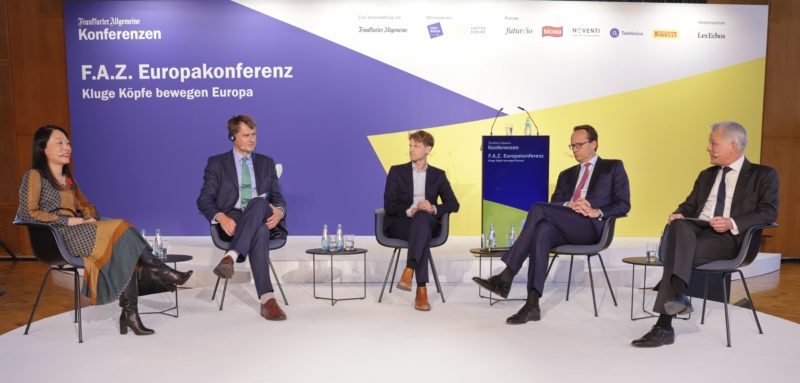
Sustainability and the Green Economy
Panel Discussion: The Future of Energy and Resource Supply in the EU – What needs to change?
Hugh Elliott, Executive Chairman, Iberdrola Energía Internacional
Dr Markus Krebber, CEO, RWE AG
Dr Yun Luo, Co-Founder and CEO, ROSI SAS
Benjamin Merle, CPO, Enpal GmbH
Moderator: Dr Christian Geinitz
Christian Geinitz: Ms Luo, you play an important role in the solar industry. Solar technology is considered green and sustainable, but on the other hand, this technology requires many resources and raw materials, and disposal is not exactly simple either. How do you contribute to a sustainable energy transition in solar power?
Dr Yun Luo: In fact, at Rosy, we are dealing with exactly this issue (recycling silicon). Silicon is the key material in solar cells. We have developed our own technologies to recycle and reprocess these high-purity raw materials.
Christian Geinitz: Mr Merle, is this offer that Rosy provides of interest to Enpal, one of the large solar providers? Can material that has been recycled be used in solar systems already?
Benjamin Merle: In the short term, I see few offers that are economically attractive, partly because the price of new modules is currently extremely low. However, if we want to become independent in the long run, the question is how we can keep raw materials within the country. In this regard, recycling plants are the “mines of the future.”
Christian Geinitz: Shouldn’t the disposal costs be factored into the prices of today’s cheap solar panels?
Benjamin Merle: That’s correct. There are many costs that still need to be internalized. Part of the costs are already being covered by developers, as they have obligations to decommission and recycle the systems. There are already relevant regulations in place.
Christian Geinitz: Mr. Elliott, your company is driving the distribution of renewable energy systems. As a former ambassador, you also have a political perspective on this topic, which is certainly important. What is your company contributing to the energy transition?
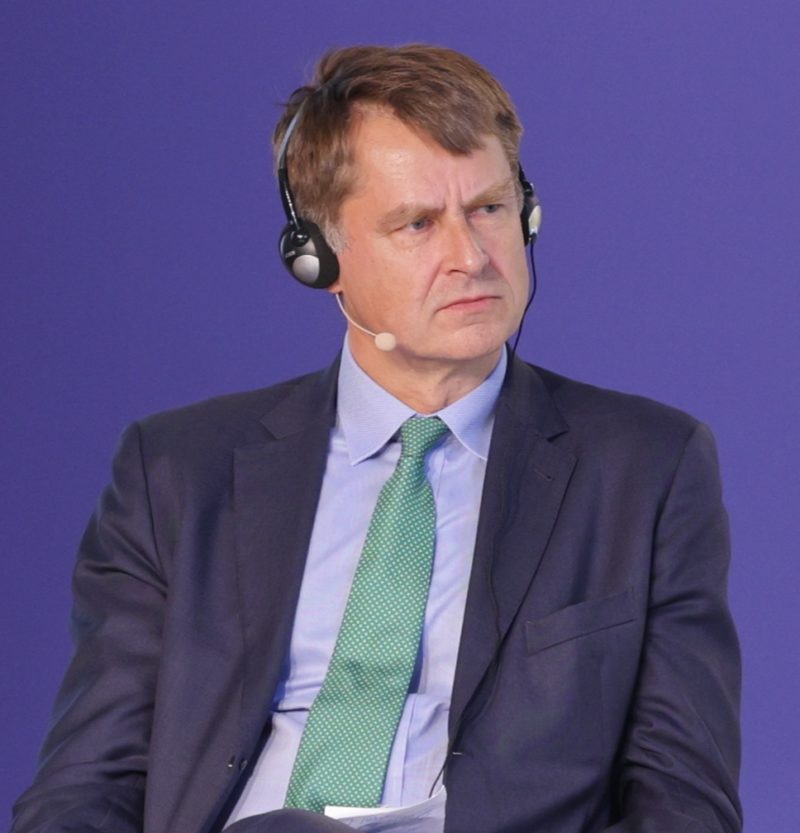
Hugh Elliott: When we talk about sustainability, we need to return to the basic principles and understand what sustainability actually means. In our industry, it’s primarily about electrification. Iberdrola took the step into renewable energy about 20 years ago and has transformed from a traditional energy supplier into a leading provider of green energy. Today, we are the largest energy provider in Europe by market capitalization and manage around 140 billion euros in assets. We generate and distribute renewable energy in eight to nine European countries and play an active role in the energy transition – with the goal of doing even more.
In Germany, we operate the largest offshore wind farm in the Baltic Sea, which has a generation capacity of nearly 800 GW. But we’re far from finished: we’re highly interested in expanding our activities further. Our vision is to create reliable energy security with renewable energy from Europe, while also making a significant contribution to climate protection. We are not just providing a sustainable solution, but also real competitiveness. We will no longer be dependent on the import of gas or fossil fuels – we generate the energy we need when the wind blows or the sun shines. These renewable resources belong to us.
Christian Geinitz: Dr Krebber, you are the largest electricity producer in Germany, and are undergoing a transformation similar to Iberdrola’s – the shift from fossil fuels to renewable energy. However, in Germany, there is still a significant share of fossil fuels, and the expansion of fossil fuel-based backup power plants remains a topic. With the coal exit law by 2030 and the exit from nuclear power, Germany is facing major challenges. Do you believe we can successfully manage the coal and nuclear phase-out?
Dr Markus Krebber: The goal is to ensure a secure energy supply that is decarbonized as quickly as possible. Whether we’re talking about 2030 or 2033, that’s not the key question. What is much more important is that we reduce the utilization of coal power plants as quickly as possible. I think we have already made good progress in Europe. For the first time, we have seen a monitoring report that shows that Europe’s climate protection goals for 2030 are nearly reached – a real achievement. This has been mainly achieved through electrification with renewable energy.
But we also need to acknowledge that issues like affordability, energy security, and resilience have now become much more important – and not just since the invasion of Ukraine. Europe imports energy, and due to geopolitical tensions, we have become much more sensitive. Then the question arises about industrial competitiveness: how can it be maintained? This, in turn, depends on energy security and affordability – a difficult triangle that we need to balance.
The expansion of renewable energy must continue, and we need far more storage technologies. The battery boom is coming – in the UK, it is already quite advanced, and now it’s really taking off in Germany too. And we need low-carbon backup capacity. Gas power plants are advantageous here because, unlike coal power plants, they can potentially be decarbonized.
Christian Geinitz: Is CCS (Carbon Capture and Storage) for coal in sight?
Dr Markus Krebber: I don’t think anyone is considering installing CCS in coal or gas power plants. Why? The utilization of these plants will continue to decrease. Eventually, the utilization will be so low that emissions won’t play a big role anymore. In the end, these power plants will just be backups when there isn’t enough wind or sunshine.
Christian Geinitz: Regarding energy security: In Spain and Portugal, the lights went out. What caused this? Are renewables to blame, as some say?
Hugh Elliott: The incident in Spain was not caused by renewable energy. Technically, it is entirely possible to run a power grid entirely on renewable energy, but for that to work, the grid must be designed accordingly. At the national level, this is a very complex task. In our countries, there are organizations responsible for the operation of the grids and ensuring that the electricity supply is maintained.
What we haven’t discussed enough yet is that the grids are increasingly becoming the bottleneck for energy supply. In many countries, we already have a high share of renewable energy, but this also requires significant investments in grid infrastructure. These investments are often less in the spotlight than the generation of renewable energy, which sounds green and sustainable. Grids, on the other hand, are seen by many as just cables and wires that no one really wants right next to them. But without grids, we cannot supply electricity with clean and affordable energy.
That’s why it’s crucial that we invest more in grid infrastructure and expand interconnectivity between countries. Europe is heading in the right direction, the political framework is in place, but we need much more investment in the grids and their interconnection to reduce costs and secure energy supply in the long term.
You can watch the full panel discussion here.
Solutions for Europe: Technology and Innovation
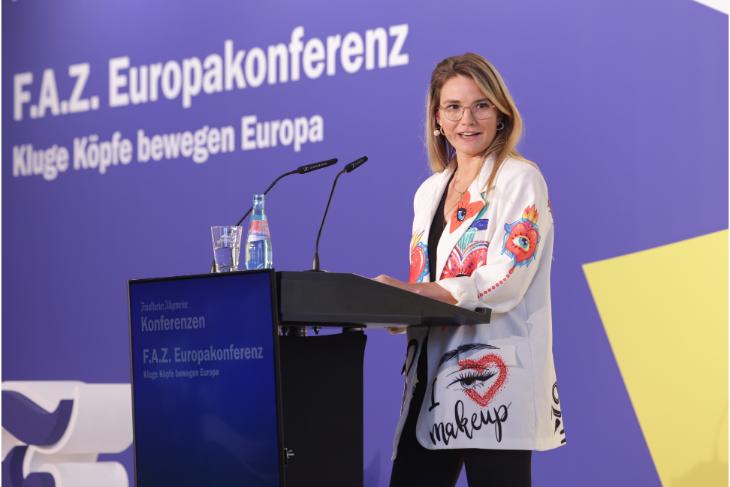
A European response to the challenges of technology and innovation must be confident, strategic, and long-term. It should not be content with reactive measures, but should aim to build its own technological ecosystems – economically viable, ethically grounded, and geopolitically sovereign. What such solutions might look like has been outlined by Dr Laura Hirvi, Public Policy Manager DACH at Meta (you can see Dr. Hirvi’s contribution here), Prof Reinhold R. Geilsdörfer, Managing Director of Dieter Schwarz Stiftung gGmbH, Roman Hölzl, Co-Founder & CEO of RobCo GmbH, and Daniel Krauss, Co-Founder & CIO of Flix SE.
Prof Reinhold R. Geilsdörfer, Managing Director of Dieter Schwarz Stiftung gGmbH
emphasized that our traditional industries are increasingly under pressure: the automotive industry and mechanical engineering are facing new competition, while the metal and chemical industries are suffering from high energy prices. It’s clear: we are in the midst of the fourth industrial revolution – a profound change that will affect nearly all areas of life.
The key question is: How can we break out of the current stagnation? And most importantly – where are our opportunities in Europe and Germany?
Fields with Great Potential for the Future:
-
Robotics
-
Defense technology
-
Quantum computing
-
Energy storage
-
Biotechnology and pharmaceuticals
-
New mobility concepts
-
Semiconductor technology
All these fields are based on key technologies such as artificial intelligence, data processing, and cloud infrastructure – technologies that have long become the foundation of our modern standard of living.
But here, Europeans face a decisive question: Do we want to permanently place central digital infrastructures – such as Microsoft, Amazon, or Google clouds – in the hands of non-European countries? This question is even more relevant since these countries often have different views on data protection and informational self-determination.
We need to be aware of where our data is stored – and who ultimately has access to it. We are still, in many ways, a data colony, handing over our information almost for free to large US corporations. Digital sovereignty is, therefore, not an abstract goal but the key to real independence and sustainable development in Europe.
Europe, with its 450 million people, has enormous potential – far more than the 170 million in the US. It is time to tap into this potential. De-risking is no longer just an issue in dealing with China, but also affects our relationships with the United States. This does not mean we should abandon trade or cooperation – on the contrary. But we need to make them more equal.
Only if we regain control over our digital key technologies can we shape Europe’s future in a self-determined and successful way.
You can watch the full speech here.
Daniel Krauss, Co-Founder & CIO, Flix SE
explained that the vision of Flix SE was clear from the very beginning: We want to make mobility in Europe affordable, sustainable, and accessible. The decisive impulse came from the legal liberalization of the long-distance bus market – a political step that not only sparked movement in Germany but in 43 countries, even enabling expansion into the US, such as through the acquisition of Greyhound.
What sets Flix apart from others is our platform model: we combine the entrepreneurial energy of medium-sized bus companies with digital technology, smart planning, and efficient distribution. Our success was also made possible by the rapid implementation of European law into German law – an example of entrepreneurial opportunities through smart policy.
We bet on entrepreneurial courage: instead of operating everything ourselves, we built a network with regional bus companies that went beyond previous growth limits. A nationwide system emerged that was based on cooperation rather than displacement.
The long-distance travel market is growing globally – and the demand for affordable, digital, and climate-friendly mobility solutions is increasing. More and more people are consciously giving up their cars and booking online. This lowers costs and improves planning. Those who are also price-attractive will be better found in digital search engines.
Deregulation can create growth. We developed an existing ecosystem – not destroyed it. The often-used “disruption” wasn’t destruction in our case, but a creative combination of existing strengths. This led to the largest network for ground mobility – with affordable prices, smart connections, and strong growth potential.
A key success factor is Simplicity – the principle of simplification. It’s about reducing complexity, eliminating unnecessary elements, and focusing on what’s essential.
Our vision remains ambitious: By 2040, we want to be CO₂-neutral in Europe. This is realistic – provided the political framework supports it. In other markets, such as India, we already operate the largest e-bus fleet – where the conditions are much more advanced.
You can watch the full speech here.
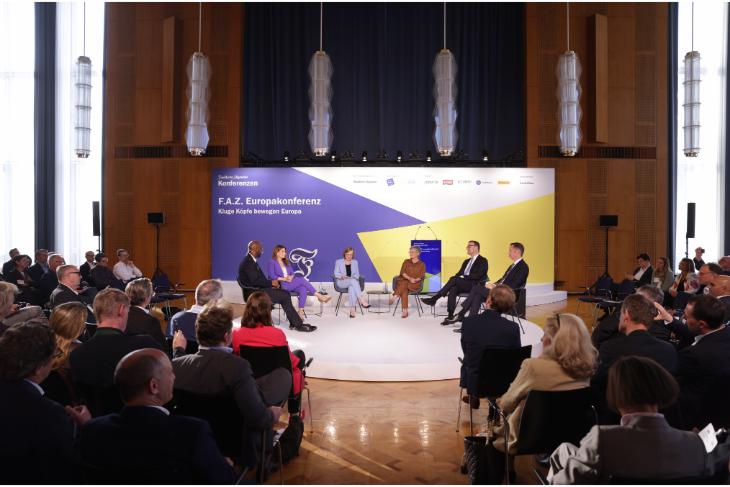
The economic Policy Debate: The role of the German Government in Europe’s economic Success – a controversial Assessment
The German economy is struggling, Europe is anxiously watching its industrial competitiveness – and the federal government is under pressure to kick-start growth again. In a controversial debate moderated by Heike Göbel, leading figures from politics and business discussed Germany’s role in European economic policy.
Participants included Jens Spahn, Parliamentary Group Chairman, CDU/CSU parliamentary group, Britta Haßelmann, Member of Parliament, Chairwoman, Bündnis 90/Die Grünen parliamentary group, Armand Zorn (SPD), Christian Dürr, Member of Parliament, Deputy Chairman of the SPD parliamentary group in the Bundestag and entrepreneur Sarna Röser. They all share concern about Germany’s economic standing, but their views on what needs to be done couldn’t be more different.
Spahn: Economic Shift and Tax Cuts
Jens Spahn, leader of the CDU/CSU parliamentary group, called for an “economic shift back to growth.” As specific measures, he announced in the short term: “30 percent depreciation on equipment investments,” the first corporate tax cut in two decades, and significantly reduced energy costs by 2026 – including the abolition of the gas levy. He emphasized that the reduction of bureaucracy should no longer remain just on paper: “Reporting obligations and receipt requirements must go.”
Zorn: Reforms Yes – But Think Structurally
Armand Zorn, deputy leader of the SPD parliamentary group, expressed openness to short-term impulses but warned against a purely “investment booster”: “We also need structural reforms.” He also pointed out the need for better skilled labor retention and called for a European-coordinated economic strategy.
Haßelmann: Invest Wisely and Socially Fair
Britta Haßelmann, leader of the Greens parliamentary group, stressed the importance of prioritizing public investments: “Transformation, infrastructure, climate protection, education – these are our future fields.” She sharply criticized blanket tax cuts, especially with regard to financing at the local level: “Favorite projects like VAT cuts in the restaurant sector do not belong in the investment program.”
Dürr: Strengthening Trust, Taking Demographics Seriously
FDP leader Christian Dürr praised the planned investment launch but warned against focusing on the wrong priorities: “Permanent subsidies for network fees are not an investment.” For him, the key is: “It’s about the bigger picture – trust in the location, demographics, education, and business-friendly conditions.”
Röser: Europe Needs Economic Strength
Entrepreneur Sarna Röser reminded that Germany must compete in the international arena: “The moral finger-pointing won’t get us anywhere – free trade agreements are not a luxury but a prerequisite for economic strength.” Europe must present itself more strategically and confidently.
Europe, the USA, China – Strategies Against Uncertainty
Geopolitical challenges also came up in the discussion. Jens Spahn advocated for a strong relationship with the USA: “Our security and prosperity depend on the USA.” At the same time, he called for lower tariffs – “0 percent on everything” – and a clear European stance towards China.
Haßelmann countered with a call: “The response to ‘America First’ can only be ‘Europe United’.” Trade agreements must be fair and transparent – national solo efforts have no place in a globalized world.
Conclusion: A Lot of Agreement on the Goal – But Little Agreement on the Way
The debate revealed: The direction – more growth, more investment, less bureaucracy – is largely consensual in political Berlin. However, the means remain highly disputed. Between tax relief, structural reform, social responsibility, and geopolitical challenges, the federal government faces an economic policy balancing act.
The crucial question remains: Can Germany be both the investment driver of Europe and maintain social balance and ecological goals? The time for mere announcements seems to be over.
You can watch the full discussion here.
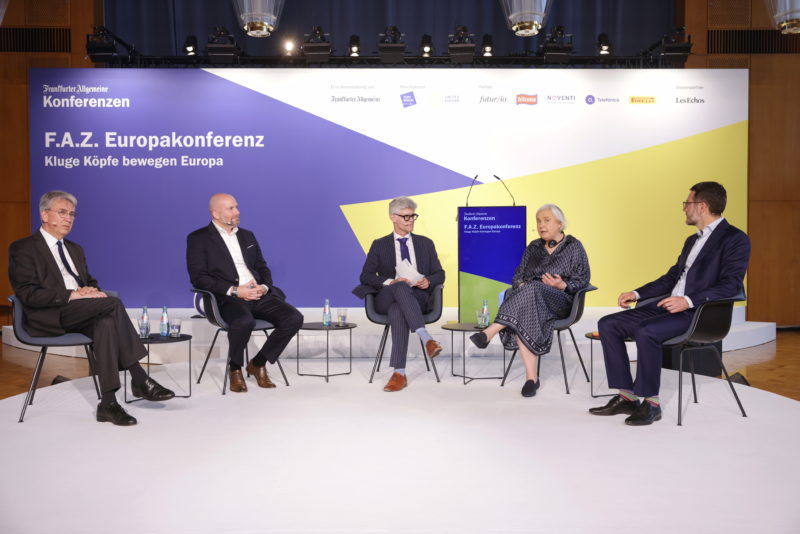
Location Europe
Panel Discussion: Focus on the European Economic Area – Evaluation of Initiatives to increase Competitiveness and Innovative Strength
In a lively discussion, Marzena Czarnecka, EU Council President, Minister of Industry, and Minister for Energy Security, Republic of Poland, Mark Böhm, CEO of Noventi Health SE, Andreas Mundt, President of the German Federal Cartel Office, and Peter Lochbihler, Global Head of Public Affairs at Booking.com, examined the current political and economic challenges facing Europe – especially in light of the recent elections in Poland and the geopolitical situation.
Europe’s Priorities
Czarnecka views the political situation in Poland post-election as more complex than before but still manageable. From a European perspective, this reflects a general trend toward the right. The EU cannot focus solely on itself but must also compete geopolitically with players like the USA, China, and Russia. Particularly, China is becoming an increasingly dominant economic power, while Russia is potentially becoming more economically dependent on China.
Czarnecka supports the recommendations from Mario Draghi’s Competency Compass:
-
Education – The career ambitions of young people often reflect a lack of real-world relevance (for example, 90% of students want to become YouTubers).
-
Financial Structure – Europe needs a balance between solidarity at the EU level and national responsibility.
-
Economic Security – Companies must be provided with stable and reliable conditions.
Andreas Mundt, President of the Federal Cartel Office, added that while progress is being made, it is happening too slowly. To truly strengthen Europe’s competitiveness, deep reforms must be initiated – particularly in the areas of:
-
Education and Infrastructure
-
Bureaucracy Reduction
-
Digital Sovereignty
-
Capital Market Union
Energy Prices – A Central Challenge
Another major topic was the high energy prices in the EU, which are about three times higher than in the US. As a potential solution, Czarnecka sees a balanced mix of renewable energy and nuclear power. France shows that amortized nuclear power plants currently represent the most cost-effective form of energy. Without state support, the energy transition will not be economically viable – public assistance is essential here.
You can watch the full discussion here.
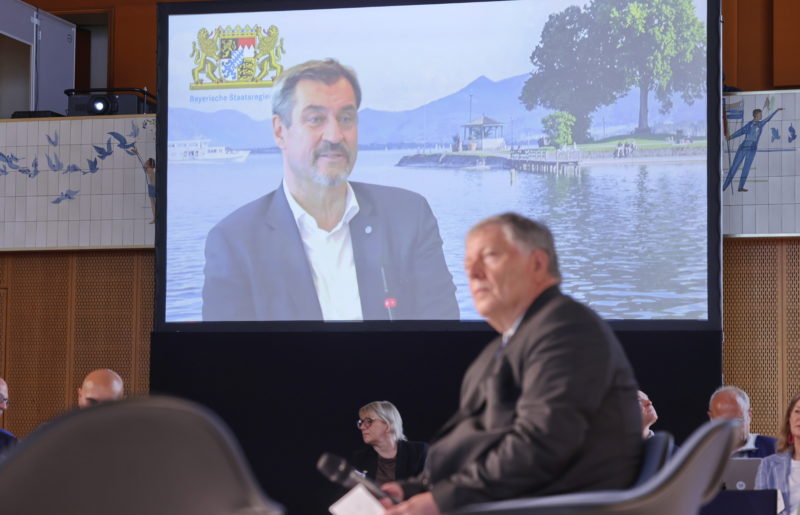
Interview – Live Broadcast
Gerald Braunberger, publisher, F.A.Z., in conversation with Dr Markus Söder, Bavarian Prime Minister (Member of the Bavarian Parliament, CSU)
Gerald Braunberger: Do you believe that the relationship between Europe and the United States will change?
Markus Söder: We hope that we can manage the situation well. However, what we can truly expect is the unexpected. I feel that the Americans are definitely interested in us – and also in the nation-states. At the same time, there is a significant reserve towards the European Union. The construct is neither fully understood nor liked. Therefore, it is important that all Europeans in the USA do not get involved in individual deals but ensure that the European aspect as a whole is strengthened. We should not split or let ourselves be played off against each other.
Gerald Braunberger: When we look at the economic situation in Europe: Where do we need to make the biggest effort?
Markus Söder: The biggest obstacle is bureaucracy. In addition, energy production needs to be stronger and cheaper. Our costs are, especially in comparison to the Americans, far too high. More investment is needed – in innovation, research, defense technology, and space exploration. These are areas where Europe could expand its strengths. We need to get much more out of the available opportunities, which also depends on the framework conditions.
In the field of defense, there needs to be, besides money, a clear structure: Where should we invest? Drones, missile defense systems, high-precision weapons? Procurement processes also need to be radically streamlined, with long-term and reliable framework conditions.
Gerald Braunberger: Don’t we need much stronger cooperation between governments and businesses in Europe, so that they can order together? One problem with the defense industry is that very few large quantities are produced because everyone has special wishes.
Markus Söder: There is a lot of tug-of-war, and it must be clearly defined who is best at what and where the most effective production should take place.
Gerald Braunberger: Shouldn’t we support private initiatives, like those in the USA, much more? Can we hope to become more competitive with a “Musk-like” approach?
Markus Söder: We should definitely do that. Six years ago, I was already talking about space exploration. A lot of money has been invested since then, we have over 12 billion euros in sales volume and more than 500 companies – it works. Of course, we won’t overtake the Americans so quickly, but we can get closer.
When dealing with our American friends, we should always keep clarity and truth in mind. Cowardice is not rewarded. In the end, only a certain amount of strength helps. Only those who are strong themselves can stand together. I don’t want Europe to end up being just a kind of Disneyland where Americans and Europeans travel to admire how beautiful old Europe was. Where we are good, we need to get better, and where we are bad, we need to get much better.
You can watch the interview here.
SAVE THE DATE 2026
We are very pleased to announce the European Economic Conference (EEC) #5. We will inform you about the program and guests in due course.
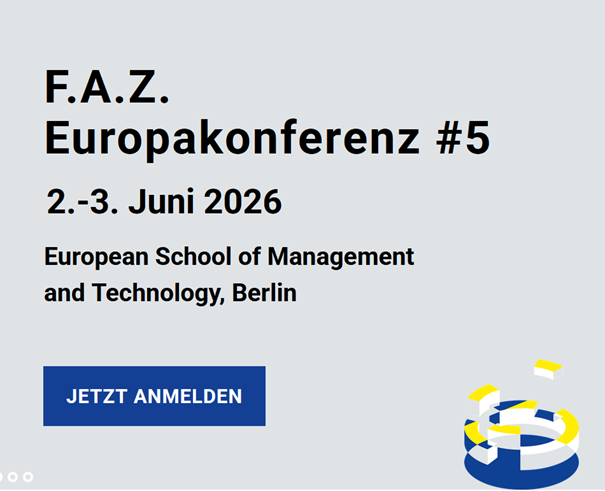
We thank the Frankfurter Allgemeine Zeitung and its publisher Gerald Braunberger, the F.A.Z. conference team, and the ESMT for the successful conference and collaboration.



